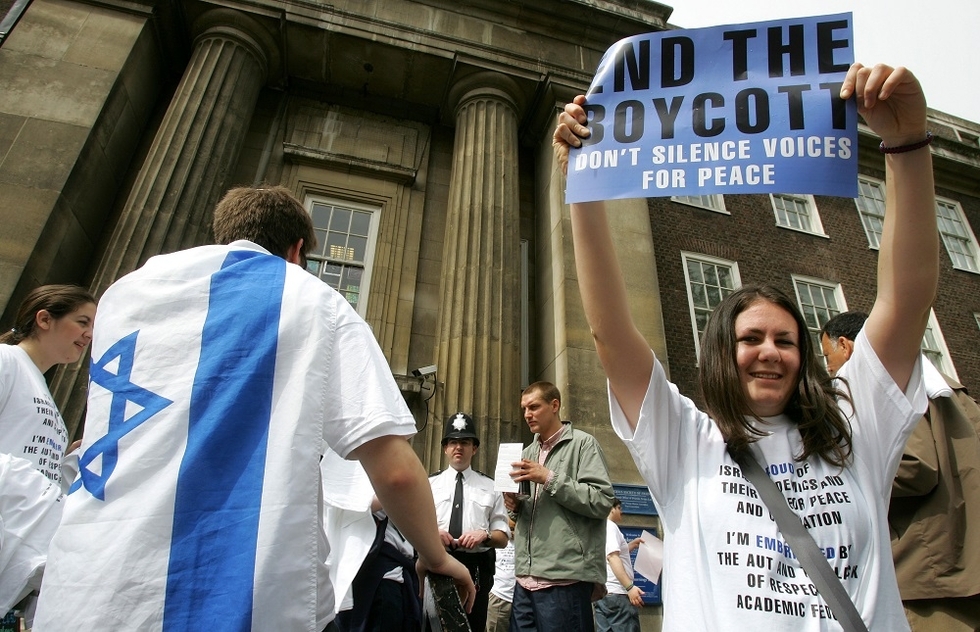UK councils face anti-Semitism claim over settlements goods ban

A group is taking legal action against three UK councils at the High Court on Wednesday in an attempt to strike down their decisions to support boycotts on Israeli goods manufactured in illegal Israeli settlements in the occupied West Bank.
Jewish Human Rights Watch (JHRW), which describes itself as an anti-racism campaign group, has won a judicial review against three authorities - Leicester, Swansea and Gwynedd – on the basis that a boycott of settlement goods is “anti-Semitic”, illegal and violates the Local Government Act 1988 and the Equality Act 2010.
In court, JHRW representatives argued that its aim was not to silence criticism of Israel but to stop local councils abusing their powers and failing to have "due regard to the impact of their actions upon the Jewish community".
JHRW has previously claimed that the boycott is similar to that imposed on Jewish shops by the Nazis in 1930s Germany.
However, War on Want, a campaign group that supports the Boycott, Divestment and Sanctions movement, slammed the review that could cost the councils tens of thousands of pounds.
"It’s shameful that local councils are being attacked for ensuring their policies are in line with international and UK law,” War on Want’s senior campaigner Ryvka Barnard said in a statement.
“Illegal settlements are a part of the systematic abuses of international law and human rights committed by Israel against the Palestinians. The UK government has reiterated over and over again that Israeli settlements in the Occupied Palestinian Territories are illegal, and has issued advice to businesses on the risks of investing in or trading with illegal settlements.”
Labour-led Leicester council, which approved, its motion in favour of a boycott in November 2014 has repeatedly stressed that it is non-binging and has no effect on the local authority's procurement of goods and services.
"The motion has never been a boycott of Israel by Leicester and is not an attack on the Jewish people," the council said in a statement last year. "It relates specifically to illegal Israeli settlements in the West Bank."
The original motion also expressly recognised the right of "Israel to exist in peace and free from incursion" but condemned "the government of Israel for its continuing illegal occupation of Palestine's East Jerusalem and the West Bank; for its continuing blockade of Gaza; and the illegal appropriation of land in the West Bank and settlement buildings".
Gwynedd council in Wales passed a more wide-ranging motion in 2014, calling for a trade embargo with Israel, condemning the "attacks by the Israeli state on the territory of the Palestinians living in the Gaza Strip" following the 50-day war that left more than 2,200 Palestinians, mainly civilians dead. More than 70 people, mainly soldiers were also killed on the Palestinian side.
"It must be made clear that the proposal condemned the Israeli state and not the Jewish religion," the council said.
Swansea City Council, meanwhile, passed a non-binding motion in 2010 that called for "support[ing] the position of the UN in regards to the Israeli settlements in East Jerusalem, so long as to do so would not be in breach of any relevant legislation".
The UK Cabinet Office has tried to move against locally imposed boycotts, including those targeting Israel, saying that it breaches World Trade Organisation rules on procurement. The government has also proposed rules aimed at stopping pension funds from “politically motivated boycott and divestment campaigns against UK defence companies and against Israel”.
But the European Union has issued new guidelines for the labelling of products from illegal Israeli settlements in the occupied Palestinian Territories, after years of deliberation and in the teeth of fierce Israeli opposition.
New MEE newsletter: Jerusalem Dispatch
Sign up to get the latest insights and analysis on Israel-Palestine, alongside Turkey Unpacked and other MEE newsletters
Middle East Eye delivers independent and unrivalled coverage and analysis of the Middle East, North Africa and beyond. To learn more about republishing this content and the associated fees, please fill out this form. More about MEE can be found here.




